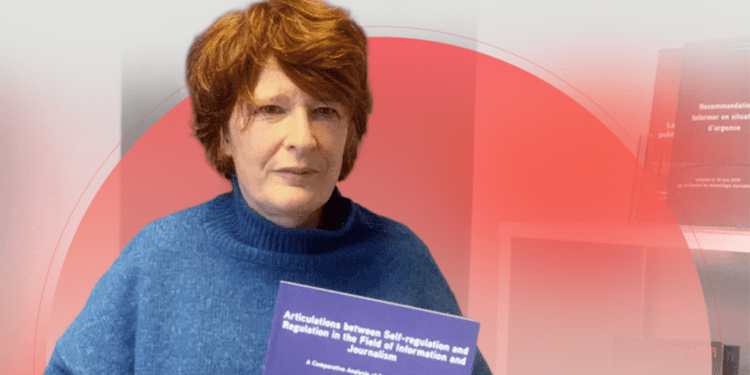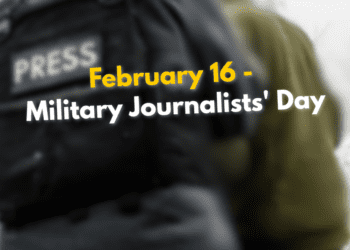Interview with Muriel Hanot, Secretary General of the Belgian Press Council (CDJ)
Muriel Hanot, Secretary General of the French- and German-speaking Press Council of Belgium CDJ), has extensive practical experience in media regulation and self-regulation. She worked in the past for the Belgian state media regulator (CSA), where she was among other things in charge of its co-regulatory body (Collège d’Avis or Advisory Council). She knows a lot about the history of its formation and its functioning. Currently, the expert is the head of the journalistic self-regulatory body and takes a closer look at the mechanisms of interaction between the co-regulation system the CDJ is part of, and the media sector.
For the Ukrainian Commission on Journalistic Ethics, Muriel Hanot discussed where the line between self- and co-regulation lies in Belgium, how new technologies affect this interaction, whether journalistic content is subject to co-regulation, and the risk of duplication of competences and actions between these different bodies.
The conversation took place in the office of the CDJ, located in the business district of Brussels, in the same building as the International (IFJ) and European Federation of Journalists (EFJ). On the bookshelf in Hanot’s office, one can find the report “Articulations between Self-regulation and Regulation in the Field of Information and Journalism” . It is a European comparative study edited by Muriel Hanot and Alejandra Michel (researcher at UNamur), which was published in 2023.
Before talking about the Belgian experience, the head of the Press Council asks in detail about the system of co-regulation in the Ukrainian media, which are a part of the co-regulatory bodies, and how their work is organised. Ukrainian co-regulation is still new and little-known by European researchers.
Ms. Hanot, tell us about the specifics of co-regulation in Belgium. How does it work?
Co-regulation in Belgium – in the French-speaking part of Belgium – is based on a unique model that combines media regulation’s action with initiatives from the audiovisual media sector. This co-regulatory instrument is named the Collège d’Avis (Advisory Council). It is embedded in the regulatory body (High Council for Audiovisual Media – Conseil supérieur de l’audiovisuel / CSA) that controls legal provisions dealing with audiovisual media and programmes.
In particular, the Collège d’Avis is legally missioned to elaborate rules on advertising, the protection of minors, the accessibility of programmes for people with hearing or visual impairments, and the balanced coverage of election campaigns. At the exception of the four members of the regulator’s steering committee, the body consists of 20 members, 20 substitutes and 12 observers. The members of the council are public and private broadcasters, local radio stations, content retransmitters, network operators and, more recently, video-on-demand providers.
This body issues opinions on any question initiated by the government or the French-speaking parliament. In other cases, the council raises the issue on its own initiative. The Collège d’Avis can create working groups to prepare decisions on specific issues. At the beginning of its creation, this body provided non-binding recommendations, but these became binding in 2009, after government approval.
For example, in 2017, the CSA adopted rules on content accessibility for people with hearing or visual impairments, which included subtitling and audio descriptions for television programmes. This text was the result of close cooperation between media organisations and the regulator. Once ratified by the government, this provision became binding for the sector and thus controlled by the regulator.
There is no such co-regulatory body in Flanders, to my knowledge. In the German-speaking part of Belgium, one body was recently created to render opinions on demand of the government and parliament. The Press Council is not a part of it. If there is a media regulatory body in each part of the country, it doesn’t mean it is always combined to a coregulatory instrument. It varies in regard to the nature of the media landscape, the interactions with the audiovisual media sector and the regulator’s remit. This emphasises the importance of adapting regulatory models to specific regional realities.
How do co-regulatory and self-regulatory bodies distinguish between their work?
The main difference is in the level of independence and the scope of responsibility. Self-regulation, in the case of the Press Council (CDJ), is based on a voluntary commitment principle: journalists and media (whatever the medium) adhere to a professional and independent body which has to define common ethical standards in news, in a Code which includes principles such as truthfulness, independence, fairness and respect of privacy. They commit themselves to respect those standards and to be accountable before their peers and the public.
On the other hand, co-regulation involves – in particular when recommendations are binding – the intervention of a state independent authority. This intervention is external to the profession, it deals with problems related to audiovisual programmes only, without entering editorial freedom issues. For example, the CSA can monitor compliance with the signage rules on children’s content to prevent the broadcast of materials that could harm the mental health of minors.
Which areas are subject to co-regulation and which are subject to self-regulation?
Co-regulation is used in areas the legislator wants to be regulated in a way that requires a sectorial collaborative approach. This applies in the French-speaking part of Belgium for advertising, protection of dignity, protection of children’s rights, and election campaigns’ coverage. An intervention in the information programmes is rare but possible. For example, during elections, the Collège d’Avis has a regulation for providing airtime to political parties to ensure a balance in the coverage of the race, or for enacting internal electoral system rules.
Self-regulation is only concerned with journalistic ethical issues and thus with media and journalistic content. For example, the CDJ ensures that journalists and media outlets adhere to the principles of transparency, avoid conflicts of interest, and report truthfully and honestly. These principles help to maintain media independence.
In other words, the co-regulatory body develops rules that can be “measured”: for example, the duration of airtime provided to different political parties, the labeling of political advertising, etc. And the news content is evaluated by the self-regulatory body, right?
The general rule is indeed that the state media regulator and the co-regulatory body do not interfere with the information content. If they do it, it is only marginally. The compliance of news to ethical standards falls under the responsibility of self-regulation.
Can self-regulatory bodies be members of co-regulatory bodies?
As a stakeholder of the media landscape, the CDJ participates in the work of the Collège d’Avis as an observer. We attend meetings, can express our opinions and submit amendments, but do not have the right to vote. The Journalists’ Association (AJP) has the same status. This observer status gives us a certain form of independence in debates, although it sometimes limits our influence.
We do not take part in discussions we are not competent for. We intervene on issues related to our missions, as it occurs for the regulation on the coverage of elections. We actively commented on a draft developed by the Collège d’Avis. Although our recommendations were taken into account, we were not able to influence the final vote.
And what proposals from the CDJ did the advisory council take into account when developing the rules for election coverage?
In 2011, the CDJ adopted a recommendation on the coverage of election campaigns. This recommendation is strictly ethical. During the latest revision of the co-regulation text, we have taken care to ensure that some of the provisions contained therein coincided with those set out in our professional principles. For example, we asked that the co-regulation rules specify that the internal electoral system rules that the media must adopt must be drawn up by the newsroom and validated by their management. This principle guarantees full editorial freedom for journalists.
Do the powers of the co-regulatory body extend to print media?
The competence of co-regulatory bodies, such as the Collège d’Avis, is limited to audiovisual media. It extents partially to online platforms releasing mainly video contents. For print media in (French- and German-speaking) Belgium, the CDJ’s self-regulation is the only form of “regulation”.
This is due to the historical tradition of press freedom in Europe, which provides for minimal state intervention. Historically, print media have been protected from regulation by the European principle of press freedom. This principle guarantees that state regulators cannot interfere with journalistic activities. Regulation in this area is thus limited to exceptional cases, such as the protection of dignity and minors, or the lack of confusion between information and advertising. But even these exceptions must be necessary, proportionate and clearly justified by law.
However, with the development of digital platforms and cross-media operations, this landscape has become even more complex. The Digital Services Act (DSA) and the European Media Freedom Act (EMFA) are examples of European legislation that introduce new regulatory challenges.
So, does the development of technology affect self-regulation and co-regulation?
Social media have complicated the traditional regulatory approach. The medium-by-medium basis is no longer working since contents are coming from different media (legacy media or “new media”), or are produced by professionals, as well as users. The platforms act as disseminators of information, but at the same time they are not responsible for this content. This creates a legal gray area. Until now, regulation (i.e., the European legislative framework) has given way to platforms’ self-regulation and co-regulation. But because these platforms are monopolies, the principle of collective interest that operates in other forms of self- or co-regulation does not apply to them. The regulatory framework is therefore necessary, provided that it goes beyond national frameworks.
During the COVID-19 pandemic, as a journalistic self-regulatory body, we have had to deal with a lot of complaints and questions that raised a problem of dis- or misinformation in journalistic work. The CDJ has been able to respond insofar as the complaints and questions concerned the journalistic responsibility of those involved (professional journalists or not) who are meant to provide verified and cross-checked information. This was not the case for other content providers. This is a different form of intervention, which does not involve the journalistic contract of trust and ethical commitment.
Do you see any overlap between co-regulators and self-regulators? Is it possible to avoid it?
Unfortunately, the problem does exist. Some of the codes and recommendations prepared by the Collège d’Avis may “enter” into the territory of journalistic ethics. This is also the case for some existing legal provisions. This applies to two specific cases of co-regulation: election campaigns’ coverage and the respect for human dignity. For example, in the area of election coverage, the co-regulatory body may interfere with issues that legally fall within the CDJ’s competence (which is defined in a decree). This creates a competing control and a risk – for the media – of different interpretations of a same principle.
One of the main concerns is the temptation of an excessive regulation of information programmes. While co-regulation offers a platform for cooperation, it also opens the door – through its regulation side – to an external state actor. This risk is bigger as the regulator’s board members are appointed by the government and the parliament on a political basis. This risk becomes particularly pronounced during sensitive periods such as elections, when regulatory decisions may inadvertently – or deliberately – jeopardise the freedom and the independence of journalists.
This is why it is essential to give priority to journalistic self-regulation in the assessment of news content. This priority is legally defined in French- and German-speaking Belgium.
To avoid such situations, we are constantly trying to improve the coordination mechanisms with the state media regulator, in common meetings, even if it is not so easy. We also work to a better knowledge and understanding of the legal framework that clarifies the respective competences of the bodies. We are taking part in the Collège d’Avis’ discussions for developing regulations that stay in tune with the ethical and self-regulation approach.
Despite these challenges, co-regulation offers valuable opportunities. It provides a platform for dialogue, allowing stakeholders to collectively define standards that reflect the realities of the media landscape. It also fosters a sense of shared responsibility, encouraging compliance and reducing the need for top-down enforcement.
However, this requires careful planning and clear boundaries. Joint regulation should be designed to complement self-regulation, not replace it. Such a balance ensures that journalistic freedom is preserved, all the while promoting accountability in the media sector.

 THE NATIONAL UNION OF
JOURNALISTS OF UKRAINE
THE NATIONAL UNION OF
JOURNALISTS OF UKRAINE
















Discussion about this post